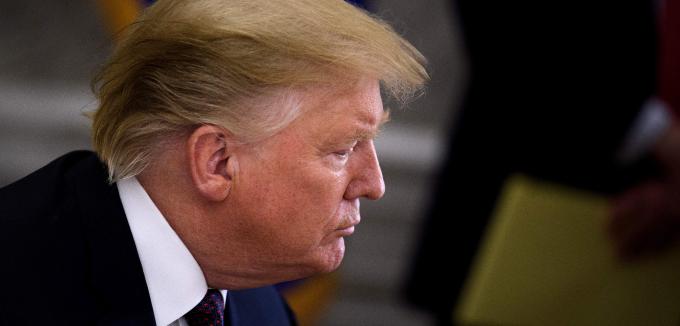Brendan Smialowski / AFP
US President Donald Trump sees car imports into the United States partly as a threat to national security and the domestic economy, but he is afraid of high tariffs on EU car imports for the time being
US President Donald Trump postpones the decision on punitive tariffs on European car imports by up to six months. He wants to wait first for negotiations with the EU. Special duties would hit hard especially BMW, Daimler and VW.
It had suggested, now it’s official: US President Donald Trump will only decide in about half a year on possible special duties on car imports, including from the EU. The delay is valid for 180 days, according to a proclamation issued by the president on Friday. Originally Trump wanted to decide by May 18 at the latest on higher taxes on car imports.
According to the presidential office Trump sees some car imports as a potential threat to the US. But he wants to wait for the outcome of negotiations with the Europeans before deciding whether and, if so, “what further action needs to be taken”. Special duties would hit especially German manufacturers such as BMW, Daimler and VW hard.
The US Department of Commerce submitted a report to the White House in mid-February to investigate whether auto imports pose a threat to US national security. Trump then had 90 days to make a decision on the introduction of special tariffs.
The German manufacturers would be hit particularly hard by the special duties. They account for a large proportion of EU exports to the US. In addition, manufacturers such as VW, Daimler and BMW as well as suppliers have their own locations in the USA. Among other things, they supply the Chinese market. From there, further punitive measures threaten the retaliation of Trump’s special tariffs against imports from China.
If the US tariffs ultimately come, the German economy threatened a total annual cost of six billion euros, warned the CEO of the German Chamber of Commerce and Industry (DIHK), Martin Wansleben: “Ultimately, these would not only hit German manufacturers but also consumers in the US. “
For a long time now, Trump’s trade policy with the EU has been a thorn in the side. In his view, European automakers, for example, can easily export to the United States, while it is more difficult for US companies.
Europe actually levies higher tariffs than the US
In fact, Europe charges slightly higher tariffs than the US on average. According to the World Trade Organization (WTO), the EU average is about 5 percent, in the US 3.4 percent are due on average. Even if one weighted the tariffs for individual goods with the imported quantities, Europe is higher. This weighted tariff is 3.0 percent for the EU and 2.4 percent for the US. For individual product groups, there are even greater differences, on cars, the EU levies about 10 percent import duty.
Trump has long been bothered by the presence of German cars on American roads. Already in 1990, he threatened in an interview with “Playboy” to impose taxes on “every Mercedes that rolls into this country.”
rei / dpa / Reuters

